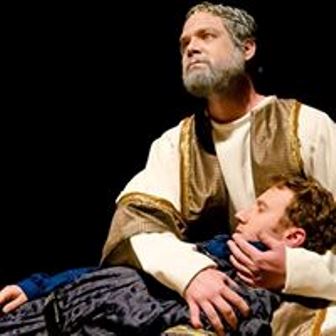
Montemezzi Returns to Cincinnati

Writing in 1947, music historian Donald Jay Grout described Italo Montemezzi’s opera “L’Amore de tre rei” (“The Love of Three Kings”) as “the greatest Italian tragic opera since Verdi’s “Otello” It was a favorite of Cincinnati Opera when it performed at the Cincinnati Zoo, twice conducted by the composer himself (1946 and 1947). It has since fallen into obscurity. Thanks to Queen City Chamber Opera and artistic director/conductor Isaac Selya, it returned Nov. 2 and 3 to the Dunham Arts Center Theater in Price Hill. The production, sung in Italian with English surtitles, marked the 100th anniversary of the opera’s premiere at La Scala in Milan in 1913.
Firmly neo-romantic, “L’Amore de tre rei” blends Italian opera with Wagnerian music drama, being largely “arioso” in style and without set pieces. Debussy (“Pelleas et Melisande”) and Richard Strauss are also cited as influences. Various motifs help weave the plot together (galloping figures in the strings, a doleful viola motif). The libretto, by Italian playwright Sem Benelli, is based on his play of the same name. Set in 10th-century Italy, it is a dark tale of adultery and murder. Archibaldo, a king who 40 years earlier conquered Altura in northern Italy, has forced Fiona, a princess of Altura, to marry his son Manfredo. Archibaldo, now blind, suspects Fiora of infidelity and, in fact, she has been seeing Avito, a former prince of Altura, to whom she was previously engaged.
Manfredo, having returned from battle, woos Fiora before leaving again for the battlefield. He asks her to wave a veil from the parapet of the castle as he rides away. She does so until Avito coaxes her down. Archibaldo catches them, but since he is blind, he cannot identify Avito, who escapes. Archibaldo strangles Fiora. Manfredo, believing something is wrong, rides back to the castle and learns what has happened. In the final scene, Avito visits Fiora, whose body lies on a bier in the crypt of the castle. He kisses her lips, which have been poisoned by Archibaldo in order to trap her lover. Manfredo, who truly loves Fiora, finds Avito dying and follows suit. Archibaldo comes to the crypt and discovers his dying son. Montemezzi sets this to music that is aptly scene-setting and lushly melodic.
Singing Avito was tenor Marco Panuccio, with soprano Esther Kang as Fiora. The two conveyed the intensity of their love with ringing voices and steamy embraces. Bass William Tvrdik as Archibaldo was well matched to his role as the blind king, delivering a soaring reminiscence of his days as a warrior in act I, dispatching Fiora with vehemence in act II, then tossing her over his shoulder and exiting as Manfredo returns to find her dead. Baritone Gregory Jebaily as Manfredo was bright as a beacon as the exemplary Manfredo, while tenor Allan Palacios Chan handled his duplicitous role as Archibaldo’s Alturan servant Flaminio with skill and insight. The chorus in act III, Alturans mourning their princess in the candlelit crypt, made a truly affecting scene.
The set was simplicity itself, a turreted castle wall with stairs to the parapet and doors at either side, lit by lanterns. Fiora (Kang) lay draped in white in the darkened crypt at the end. Period costumes were used. The 34-piece orchestra performed splendidly under Selya, with offstage trumpets to announce the arrival and departure of Manfredo.
Judging from the response of the audience, Montemezzi’s forgotten masterpiece may live again in Cincinnati.
Founded in 2012, with a mission to “bridge the gap” between opera training and opera careers, Queen City Chamber Opera calls itself “unique among opera companies” in that it is structured “with complete vertical integration in artistic preparation.” Selya and assistant conductor Jesse Leong handle all aspects of artistic preparation (coaching singers, preparing parts, conducting rehearsals and performances, etc.). Selya's translation of "L'Amore de tre rei" was used in the surtitles for the Dunham Theater production.
This not only cuts costs, but, according to the company, “ensures
unity of artistic vision.” It also enriches the local opera scene by presenting
professional opera during the months Cincinnati Opera is dark (Cincinnati Opera
presents during June and July). Past achievements include double bills of
Mozart’s “Der Schauspieldirektor” and “Bastien und Bastienne” and Mozart’s “Zaide”
and Weber’s “Abu Hassan.” (first published at www.ConcertoNet.com)